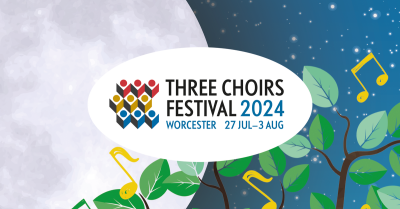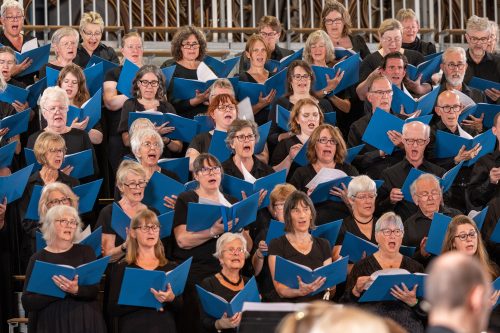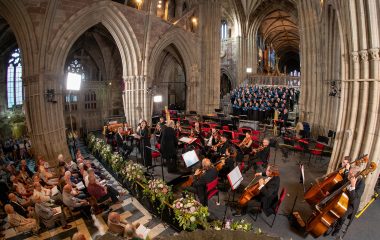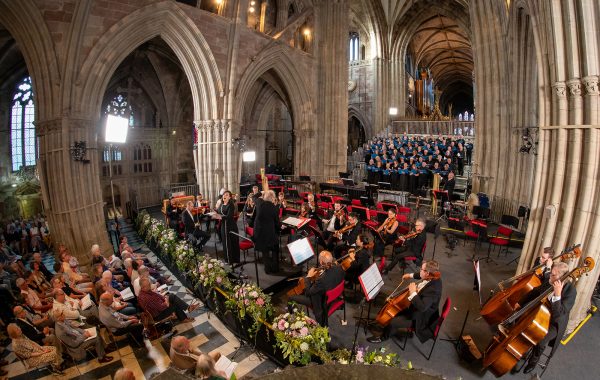
 United Kingdom Three Choirs Festival [2] – Dearden, Weir, Respighi, Holst: Beth Taylor (mezzo-soprano), Three Choirs Festival Voices, Philharmonia Orchestra / Geraint Bowen (conductor) Worcester Cathedral 28.7.2024. (JQ)
United Kingdom Three Choirs Festival [2] – Dearden, Weir, Respighi, Holst: Beth Taylor (mezzo-soprano), Three Choirs Festival Voices, Philharmonia Orchestra / Geraint Bowen (conductor) Worcester Cathedral 28.7.2024. (JQ)

Nathan James Dearden – messages (Festival commission, premiere)
Judith Weir – Still, Glowing (2008)
Respighi – The Birds (1928)
Holst – The Cloud Messenger Op.30 (1910-12)
The Three Choirs Festival launched the Festival Voices at the 2023 Gloucester Festival (review here). The idea is a great one. It recognises that not all singers can commit to the arduous series of twice-weekly rehearsals undertaken by the Festival Chorus from Easter onwards. So, members of the Festival Voices have a less demanding schedule and focus on just one programme. Membership of the Festival Chorus is by audition; I am unsure if the same applies to the Festival Voices. Here, under the guidance of Geraint Bowen, the Festival Voices were entrusted with a rare performance of a substantial work by Holst and with the unveiling of a new work commissioned by the Three Choirs Festival
It was the new work that opened proceedings. Nathan James Dearden (b.1992) is a Welsh composer of concert music and mixed media, conductor, and educator. Currently, he is the Director of New Music Collective and New Voices Consort at Royal Holloway, University of London. I was intrigued that in his biography in the Festival programme he is referred to not as a composer but as a ‘music creator’.
His new work, messages is scored for solo mezzo-soprano, choir, percussion, timpani, and string orchestra. The composer describes the work thus: ‘Initially inspired by Gustav Holst’s The Cloud Messenger… messages looks at how we respond to life events that either shock or move us. These five movements explore the ways in which messages have permeated our collective history, from one culture to another, one generation to another. Each movement is inspired or sets the words from either a civilisation or a person who wanted to share, to honour, or to warn.’ The movements are short – this performance played for about 18 minutes – and Dearden sets a variety of texts, including a Mayan account of the Spanish Conquest (1540-1546), a poem called ‘Ascension’ by Amelie Simon (Worcestershire’s 2023 Young Poet Laureate), excepts from two Psalms and a public report from Sandia National Laboratories (1993) concerning the long-term dangers of nuclear waste. With such an assemblage of texts – including others I haven’t mentioned – it is clear that messages is designed as a very serious work which demands music that is serious in tone. The serious tone was achieved; I only wish, though, that the piece had made a more positive impression on me.
One major problem with it was the unremittingly grey nature of the accompaniment, at least in the first three movements. There seemed to be little attempt at instrumental colour and, frankly, the effect was boring. This problem was compounded by the nature of the vocal writing, especially for the choir. Their music – and the words they sing – is fragmentary and almost chant-like in nature, lacking any melodic memorability that I could discern. As the piece unfolded, I pondered to myself that it was hard to imagine that the choir had had a great deal of fun in rehearsing this music. Matters improved somewhat in the last two movements; in particular, the text concerning nuclear waste (movement five) prompted more ardent music but, if I am honest, by then it was too late for me. Mezzo soloist Beth Taylor sang with feeling but the material she was given was rather thin gruel. The Festival Voices did their best too and played their part in the increasing ardour towards the end of the work. I am always wary of passing judgement on a piece on the basis of a single hearing. However, I found messages very disappointing. Whereas, despite some reservations, I would be intrigued to hear again the new work by Grace-Evangeline Mason which I had heard the previous evening (review here), I can’t see myself rushing to experience messages a second time. Mine may have been a minority view; Dearden was warmly applauded after the performance.
Two orchestral items followed. First came Still, Glowing by Dame Judith Weir, whose seventieth birthday is being celebrated this week at the Festival; she was present to hear this performance. This short work – it only plays for about four minutes – is scored for flutes, clarinets, keyboard percussion and strings. The composer describes it as her sole attempt to date at writing ‘ambient music’. As such, the music, which is mostly hushed, might be described as fairly static but the scoring is gently luminous and attractive to hear. I found the instrumental scoring per se much more inventive and interesting than Dearden’s. The Philharmonia’s playing was refined.
Then, Geraint Bowen led a performance of Respighi’s suite for small orchestra, Gli Ucelli (The Birds). The five short movements are orchestrations of keyboard pieces by Baroque composers, most of whom, with the exception of Rameau, are not especially well known. Respighi eschewed the vast orchestral panoply of works such as his ‘Roman Trilogy’ of tone poems – such an orchestral array would have swamped these modest pieces – but his orchestrations are no less inventive and sparkling. Bowen’s performance was refreshing. I liked the sprightliness of the Prelude and the tenderness with which ‘La Colomba’ (The Dove) was played. In ‘La Gallina’ (The Hen) we heard the said fowl clucking and pecking in a lively and witty fashion. The Philharmonia played all five movements delightfully. I thought it was significant that work and performance received the warmest applause of the evening so far.

Holst completed The Cloud Messenger in 1910, revising it in 1912. Its origins lie several years earlier, however, when Holst began to explore Sanskrit literature. He so fell under the spell of Sanskrit that he taught himself the language and was able to make his own English translation of the text he chose to set in The Cloud Messenger. The words come from a Sanskrit love poem entitled Megadūta, written by the fifth-century poet Kālidāsa. He scored the work extravagantly. The full version calls for a mezzo-soprano soloist, SATB chorus and semi chorus and a very large orchestra. Perhaps unsurprisingly, few performances of the full version have ever taken place, though the late Richard Hickox recorded it for Chandos back in 1990. However, I learned from the booklet accompanying a more recent recording conducted by Joseph Fort that Holst’s friend, the composer and conductor, W G Whittaker (1876-1944) conducted several performances using his own greatly reduced ensemble of piano, string quintet, timpani and percussion.
Perhaps taking heart from Whitaker’s precedent, in 2019 Joseph Fort made his own reduced scoring of The Cloud Messenger which he recorded with the Choir of King’s College, London, of which he is director. This version trims back Holst’s scoring to just 15 players: 2 violins, viola, cello, double bass, single woodwind, horn, trumpet, trombone, harp, celeste, percussion. In a booklet note, Fort explained that he ensured that the original harmonic and melodic ‘skeleton’ of Holst’s score was left intact: no notes have been added or removed. He describes his version as a ‘leaner’ version of the original. I very much admired the skill of Fort’s arrangement when I heard it on CD; in my review (here) l said this: ‘One reason why I think Fort’s version not only works well but also has fidelity to the original is that, for all the vast forces stipulated by Holst, he actually used them with great discretion. So, the full orchestral panoply is unleashed but rarely, and much of the scoring displays the sort of delicacy that we encounter in, say, ‘Venus’ from The Planets, a score that was to follow The Cloud Messenger quite swiftly. Fort’s scoring makes the piece more intimate.’ So, I was intrigued to hear Fort’s version of a piece that I have never had the opportunity to hear other than on CD. However, the performance wasn’t quite what I expected in that Fort’s scoring had been expanded. From my seat it was hard to see the precise forces involved but it appeared that the single strings had been increased to two or three desks of each instrument. I suspect the chamber orchestra was of similar dimensions to the one we had heard in the Respighi. I think this was a very pragmatic- and successful – decision in light of the large acoustic of the cathedral and because the choir of some seventy singers was much bigger than the 22-strong choir involved in Fort’s recording.
One thing I had forgotten from the recording was how wordy the libretto is; to be honest, Holst set far too much text. Much of it is narrative in nature and set for the choir; I wonder if the piece might have been more effective if Holst had made greater use of solo voices; as it is, there is just one solo episode for the mezzo. Here, I must commend the members of the Festival Voices. They had an awful lot of words to sing and their diction was very good indeed; I found it quite easy to follow the text in the programme, even though I was halfway down the nave. I thought I detected a few moments of slight untidiness in the choral singing but overall, I thought the choir made a very good job of music which has its complexities and which, I am sure, would have been unknown to any of them before they began to rehearse it. They gave a very creditable and committed account of Holst’s music.
I am not sure I have ever heard Beth Taylor before tonight, though she had an impressive CV in the programme. She is billed as a mezzo but, to my ears, has a touch of the contralto; certainly, her tone is very full and her lower register is strong. There is also a bit of an edge to her tone – I don’t mean that as a criticism because the edge is beneficial in terms of clarity. She did well in the Dearden piece and the Holst allowed her ample opportunity to demonstrate the expressive nature of her singing during her one, extensive solo. I thought she was imaginative in the way she delivered this; she identified well with both words and music.
The Philharmonia played extremely well; they brought out all the colours in the scoring and, where called upon, projected powerfully. However, much of the instrumental writing in this work is delicate in nature and Holst’s music definitely benefitted from the finesse these musicians displayed. Geraint Bowen conducted the work very well and in particular he guided his choir clearly through the music, animating and encouraging them.
This was an evening in which the music was rather uneven though the performance standards were high. After two years of the Festival Voices project, I wonder if the time has come for the Festival to re-evaluate it. The concept is excellent, but I don’t think the repertoire choices have been very good, especially in the context of trying to widen participation in the Festival. Last year’s choice of a piece by Graham Fitkin was seriously misguided and I would argue the same about the new Dearden work; neither piece, I think, is ideally encouraging for singers wanting a part of the Three Choirs experience, though they certainly expose the singers to music of our own time. In some ways, the same is true of the Holst; it is a piece that has its moments but it is not remotely in the same league as Hymn of Jesus, nor is it as memorable. I hope the Festival Voices project will continue but I think a rethink may be beneficial. In the meantime, though, those who took part this evening should be warmly congratulated.
John Quinn
